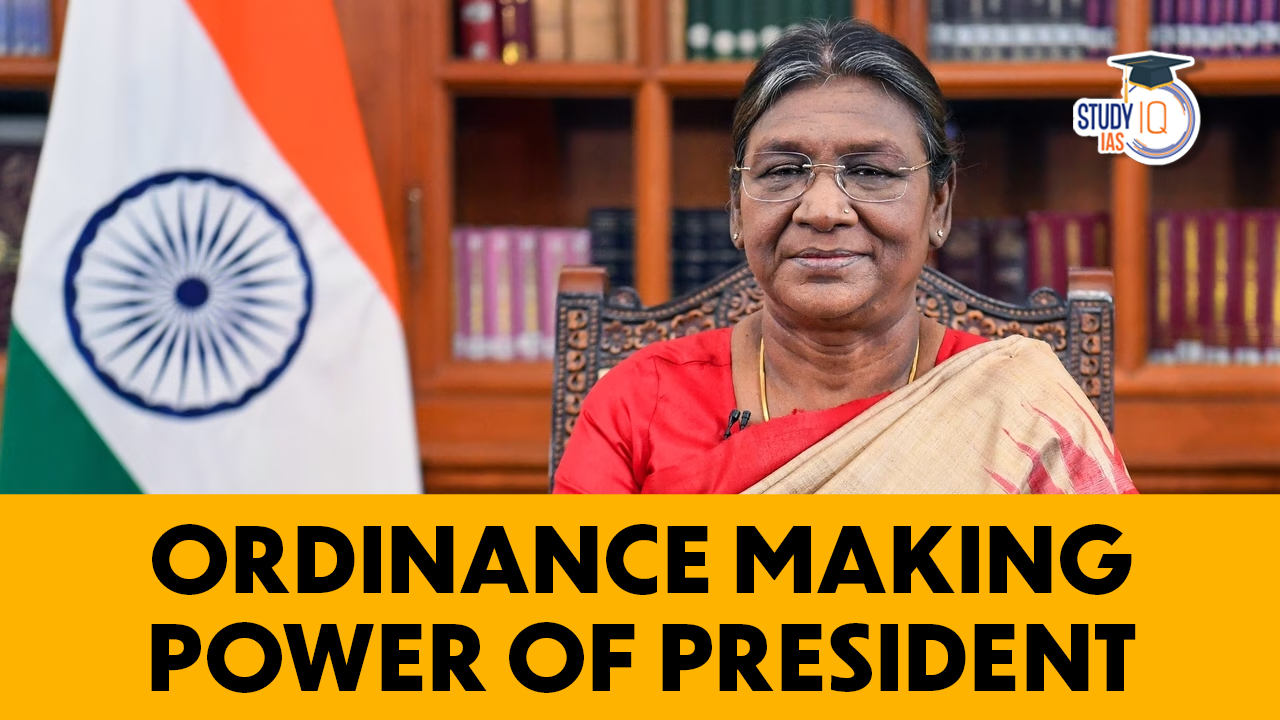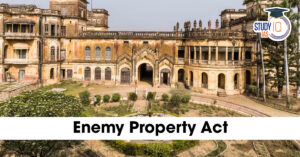Table of Contents
Ordinance Making Power of the President
As per Article 123 of the Indian Constitution,
- If the President believes urgent action is needed when Parliament is not in session, he can issue Ordinances.
- An Ordinance has the same power as a law made by Parliament, but:
- It must be presented to both Houses and will expire six weeks after Parliament reopens, unless both Houses disapprove it earlier.
- The President can withdraw it at any time.
Note: Where the Houses of Parliament are summoned to reassemble on different dates, the period of six weeks shall be reckoned from the later of those dates for the purposes of this clause.
3. If an Ordinance includes provisions that Parliament cannot make, it will be considered void.
The ordinance-making power of the president is an important part of Indian Polity which is an important subject in UPSC Syllabus. Students can also go for UPSC Mock Test to get more accuracy in their preparations.
Ordinance Making Power of the President Meaning
It is impossible for a single House of Parliament to pass and carry out legislation due to Article 123 of the Indian Constitution, which gives the President of India significant legal authority. This power includes the ability to issue ordinances while neither of the two Houses of Parliament is in session. The Government of India Act, 1935, which gave the Governor General the power to publish Ordinances, added Ordinances to the Indian Constitution. When both chambers are in session, an ordinance is void and unenforceable.
Within six weeks of its reassembly, the Parliament must pass the ordinance. The President has the right to revoke an ordinance at any moment. But he is only permitted to promulgate or revoke an ordinance on the advice of the council of ministers, which is presided over by the prime minister. An ordinance can be retroactive, which means it can take effect as of a previous date, just like any other piece of law. Any act of Parliament or other decree may be amended or revoked by it. It may also modify or replace tax law. However, it cannot be used to change the Constitution.
Ordinance Making Power of the President History
Indian Council Act 1861 empowers the Governor-General to promulgate ordinance without the council’s concurrence during emergencies. The Government of India Act 1935 included provisions for ordinances in the Indian Constitution, giving the Governor-General the power to issue them. Sections 42 and 43 of this act state that the Governor-General can only do this when immediate action is needed. There was much debate about this power in the Constituent Assembly, with some members arguing it goes against constitutional principles and is extraordinary.
This power was created to help the executive respond quickly to unexpected situations when Parliament isn’t in session. Experts suggest it should only be used in emergencies.
Ordinance Making Power of the President Limitation
When legislature is not in session
The President can only issue an ordinance when neither house of Parliament is meeting. If an ordinance is passed while both houses are in session, it is not valid. This means the President’s power to make ordinances is not the same as having full legislative power.
Coextensive as regards all with the law-making powers of the Parliament
The President’s power to make ordinances is similar to Parliament’s power to make laws, except for how long they last. This means:
- The President can only issue ordinances on topics that Parliament can also make laws about.
- Ordinances must follow the same rules as laws made by Parliament, so they can’t take away any fundamental rights.
Immediate action is needed
The President can issue an ordinance only if he believes there is a need for immediate action. This decision can be challenged in court if someone questions it.
Must be laid before the houses
Every ordinance issued by the President while Parliament is not in session must be presented to both Houses when they meet again. If both Houses agree to the ordinance, it becomes a law. If they do nothing, the ordinance will expire six weeks after they come back together. It can also be canceled earlier if both Houses vote against it.
Ordinance Making Power of the President Judicial Review
The 38th Amendment Act added a new Clause (4) to Article 123, which states that the President’s satisfaction with the issuance of the ordinance is final and cannot be appealed to the court for any reason. However, the 44th amendment to the Indian Constitution cancelled it and made the President’s satisfaction subject to judicial review, stating that the president’s powers could be challenged in court of law, if it is based on bad faith, corrupt motives, or has any malaise of intent.
He can make an ordinance only when he is satisfied that the circumstances make it necessary for him to take immediate action. In Cooper case, (1970), the Supreme Court held that the President’s satisfaction can be questioned in a court. Thus, the President’s satisfaction is justiciable on the ground of malafide. Further in S.R. Bommai v. Union of India, the scope of Judicial Review was expanded and any action by the President taken without the relevant materials would be considered to be in bad faith.
Ordinance Making Power of the President and Governor
| Ordinance Making Power of Governor (Article 213 ) | Ordinance Making Power of President (Article 123) |
| He can issue an ordinance when the Legislative Assembly is not in session in a unicameral legislature, or when both the Legislative Assembly and the Council are not in session in a bicameral legislature. | He can promulgate ordinance when either Lok Sabha or Rajya Sabha is not in session or if both are not in session |
| He can issue an ordinance only for topics that the state legislature can create laws about. | He can issue an ordinance only for issues that Parliament (Lok Sabha and Rajya Sabha) can make laws about. |
| His ordinances have the same impact as state laws. If he issues an ordinance on matters that the state government cannot decide on, that ordinance is invalid. | His ordinances have the same effect on policies as acts passed by Parliament. |
| He has the right to revoke the ordinance at any moment. | He has the right to revoke the ordinance at any moment. |
| His power to issue an ordinance is not his choice alone, he must first get advice from the Council of Ministers, led by the Chief Minister. | His power to issue an ordinance is not up to him alone, he must first get advice from the Council of Ministers, led by the Prime Minister. |
Ordinance Making Power of the President UPSC
In most circumstances, the power to make ordinances is a contentious and debatable matter. It attempts to upset the balance of executive and legislative powers by introducing arbitrariness into the Constitutional System and undermining the rule of law. When an executive body exercises such ordinance-making authority, it displays disdain for the legislative. Students can read all the details related to UPSC by visiting the official website of StudyIQ UPSC Online Coaching.


 Admiralty (Jurisdiction and Settlement o...
Admiralty (Jurisdiction and Settlement o...
 Enemy Property Act in India, Background ...
Enemy Property Act in India, Background ...
 Phone-tapping in India, Legal Framework ...
Phone-tapping in India, Legal Framework ...





















